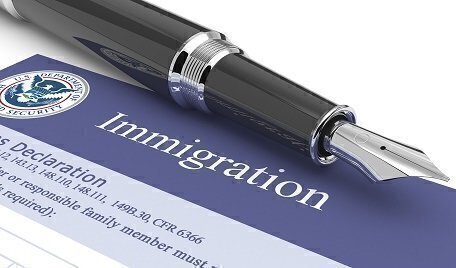President Donald Trump wants his Justice Department to quickly pursue a hearing at the Supreme Court for his immigration ban case. The timing would be unusual but not totally unprecedented if the case were argued before next fall.
 On Monday morning, Trump made his thoughts known in a series of Twitter messages that questioned his own Justice Department officials and the speed of the legal process.
On Monday morning, Trump made his thoughts known in a series of Twitter messages that questioned his own Justice Department officials and the speed of the legal process.
“The Justice Dept. should have stayed with the original Travel Ban, not the watered down, politically correct version they submitted to S.C.,” Trump said. “The Justice Dept. should ask for an expedited hearing of the watered down Travel Ban before the Supreme Court - & seek much tougher version!” And in a parting shot, Trump remarked that “the courts are slow and political!”
The Justice Department’s appeal of federal court injunctions against the immigration ban is already at the Supreme Court on a fast track. Case briefs from all parties are due at the Supreme Court on Monday, June 12 at 3 p.m. And a decision of some type from the Court could follow later next week about accepting the case for arguments, along with lifting injunctions against policies that temporarily limit immigration from six Muslim-majority countries and from all refugees.
But the federal government’s lawyers didn’t try to persuade the Justices to extend the current term longer than its conclusion at the end of June in order to get the cases finally decided.
So what if the Justice Department decides to ask for a much-quicker resolution of the cases in the court documents it files in the next week, or if President Trump publicly insists the immigration ban cases are decided now, instead of later?
On rare occasions, the Supreme Court has taken and decided important cases on short notice. But the sense among current court watchers is that the odds are much better of the Court taking the Trump immigration ban cases for arguments in the fall, giving both sides in the case, and interested parties, ample time to file briefs with the Court.
One significant case decided outside of the Court’s normal term time period was United States v. Nixon in 1974, when the Burger Court extended the end of its term by several weeks to consider the fate of the Watergate Tapes. Petitions with the Court were filed on May 31, 1971 and June 15, 1971. The Supreme Court heard arguments on July 8, 1974 and reached a decision two weeks later.
Three years earlier, the Court expedited its decision in the Pentagon Papers case after the New York Times published classified document excerpts about the Vietnam War on June 13, 1971. The case quickly made its way through the appeals process and arguments were heard at the Supreme Court on June 26, 1971, with a final decision on June 30, 1971.
The Court can also conduct a special sitting between July and October, although that is a rarity. On September 9, 2009, the Justices heard arguments in the Citizens United case. On September 8, 2003, the Court also held a special sitting to hear a predecessor case, McConnell v. Federal Election Commission. The final decisions in both cases came months later.
And during World War II, the Court heard Ex parte Quirin in July 1942, a case about presidential war powers and the jurisdiction of a United States military tribunal instead of a civilian court in the trial of German saboteurs caught in the United States.
For now, the Court’s rulings next week about the injunctions could speed up the legal process for the Trump immigration cases. If the Court decides to allow the temporary 90-day ban on the six Muslim-majority nations and the 120-day refugee ban to go into effect until the cases are decided at the Supreme Court in the fall, the cases could literally be a moot point – since the bans would expire by then.







